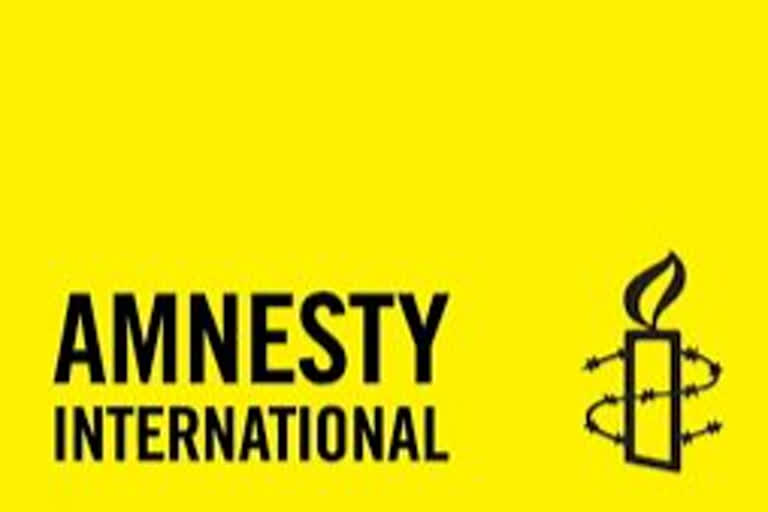Srinagar: Concerned over the multiple raids in Kashmir by the National Investigation Agency (NIA), global human rights watchdog Amnesty International has asked the Government of India to "immediately halt its intensifying suppression of dissent". The statement comes a day after the NIA carried out a series of raids at 16 locations in the Valley in two days while probing diversion of funds meant for charitable activities to "secessionist and separatist" activities in Jammu and Kashmir.
Among the individuals whose premises were raided by the agency include activists Khurram Parvez, coordinator of the Jammu and Kashmir Coalition of Civil Society (JKCCS), and Parveena Ahanger, chairperson of the Association of Parents of Disappeared Persons (APDP). These associations have worked widely to bring out examples of supposed denials of basic liberties in Kashmir by the Indian Government and featured the extrajudicial execution of human rights defenders and torture of people in detention.
Besides them, raids were also conducted at the offices of the NGOs Athrout and Greater Kashmir Welfare Trust and the residence of senior Kashmiri journalist Parvez Bukhari.
"These raids are an alarming reminder that India’s government is determined to suppress all dissenting voices in Jammu and Kashmir. The authorities are targeting these civil societies and media groups because of their continued work reporting and advocating for the rights of the people of Jammu and Kashmir despite a harsh communications blackout that was imposed by the Indian government in the region since 5 August 2019,” Julie Verhaar, Acting Secretary-General of Amnesty International, said in a statement.
Also read: 15K devotees to be allowed to offer prayers at Vaishnodevi Temple from Nov 1
"The government's actions are violations of freedom of expression and association. In a worrying pattern, the UAPA and the foreign funding law are being repeatedly and deliberately weaponized to intimidate, harass and restrict the ability of civil society groups from operating," the statement read.
Interestingly, on October 1, Amnesty India's operations were halted after its bank accounts were frozen by the government, shortly after it released a situation update on human rights in Jammu and Kashmir.
The statement released by Amnesty also featured the work done by APDP and JKCCS which include submission of almost 40 testimonies of victims who were subjected to arbitrary detention and torture by security forces in Kashmir, to the Working Group on Arbitrary Detention and the UN Special Rapporteur on Torture in September 2020 by the APDP. Before that, JKCCS had on August 5, published its bi-annual human rights review documenting the extrajudicial executions of at least 32 individuals and the impact of internet shutdowns in the region.
Highlighting the use of UAPA and FCRA for criminalising religious minorities, political dissidents and human rights defenders, the statement said that they have been repeatedly criticised by UN human rights experts. In one such instance in October 2020, Michelle Bachelet, the UN High Commissioner for Human Rights had appealed to the government of India to review the FCRA and its compliance with international human rights norms. Bachelet had also expressed her regret that the foreign funding law was being “used to deter or punish NGOs for human rights reporting”.
Amnesty also pointed out that several organisations have been targeted under the foreign funding law, including Greenpeace India, Lawyers Collective, Centre for Promotion of Social Concerns, Sabrang Trust, Navsarjan Trust, Act Now for Harmony and Democracy, NGO Hazards Centre, and Indian Social Action Forum since 2014, the year in which the NDA government under Narendra Modi was first elected to power.
Also read: K K Sharma resigns as advisor to JK L-G, appointed State Election Commissioner
During the pandemic, the FCRA was amended without any public consultation in September 2020 which, according to Amnesty International, was an attempt by the Indian government to choke civil society in India.
The Situation Update released by Amnesty International India documented the physical attacks on and intimidation of at least 18 journalists since August 5, 2019. It also demanded the withdrawal of a draconian media policy which was introduced by the government to create “a sustained narrative on the functioning of the government in media” by checking on “anti-national activities”.
According to Amnesty, “by directly attacking and failing to protect civil society organisations, India stands in a clear violation of its human rights obligations, particularly Articles 19 and 22 of the International Covenant of the Civil and Political Rights (ICCPR), to which it’s a state party”.



